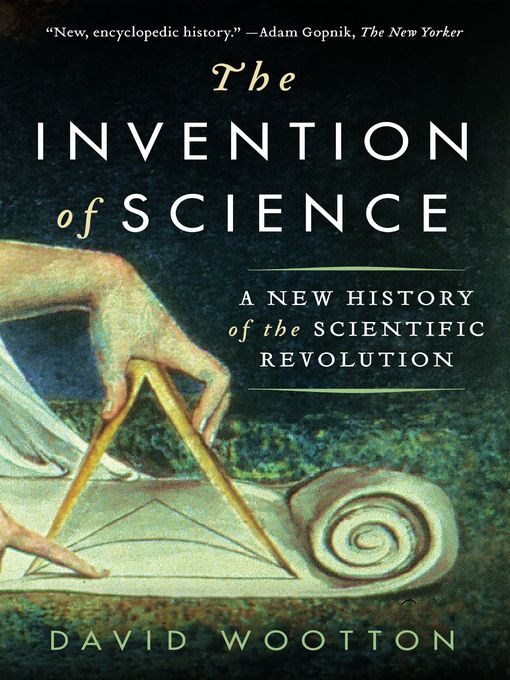
The Invention of Science
A New History of the Scientific Revolution
کتاب های مرتبط
- اطلاعات
- نقد و بررسی
- دیدگاه کاربران
نقد و بررسی

October 19, 2015
This substantive narrative of human progress is engaging and well constructed for the general science or history reader. Wootton (Galileo: Watcher of the Skies), professor of history at the University of York, makes a powerful, though currently unpopular, case against a Wittgensteinian historical relativism that sees science as entirely a social construct, changing gradually and continuously since antiquity. Wootton argues instead for viewing the period between 1572 and 1704 as a scientific revolution in a true sense, during which multiple strands of thought, technology, and culture came together in unexpected ways to transform human understanding of the physical world—the “triumph of Newtonianism,” which still informs modern research and dialogue. Analysis of primary texts from key philosophers as well as chronological details of their development and use of instrumentation sit beside broader-reaching approaches that explore linguistic change over time, how perspective-drawing techniques influenced astronomy, the ways the printing press helped form critical communities, and social analyses of the “mathematization of nature” and the decline of the appeal to authority, among other topics. Wootton’s arguments stand effectively on their own, making the final chapters directed at his historian colleagues feel like bloated academic infighting. Illus.

November 15, 2015
This highly linguistic take on the scientific revolution is not for the easily daunted. Wootton (history of science, Univ. of York; Galileo) paints an intriguing picture of how language and science evolved together from 1572 to 1704. He points out that the concept of "discovery" was largely unknown before Christopher Columbus's journey to America, and that specialized terms such as scientist, fact, or experiment didn't take hold until the 16th century. The book begins chronologically, but readers without a firm grounding in early modern science may get lost. Another flaw is the almost complete lack of women in the narrative. Although the major players in the scientific revolution were male, Wootton mentions quite a number of obscure male contributors, so it would have been nice to include at least a few women. Most critically, this work doesn't address modern debates about science in day-to-day life (the reliability of scientific proof of global warming, evolution, etc.) and is focused instead on debunking the relativist perspective of the history of science. VERDICT Although academics, who will catch the foreshadowing, will have no trouble following Wootton's argument, casual readers are likely to quit before they reach the payoff.--Cate Hirschbiel, Iwasaki Lib., Emerson Coll., Boston
Copyright 2015 Library Journal, LLC Used with permission.

Starred review from October 15, 2015
Not exactly a history of science but of our idea of science: a shrewd, thoughtful analysis of how our view of finding truth held steady throughout history and then, over a century, changed and produced the dazzling progress we often take for granted.Until the 16th century, most people believed that everything worth knowing was already known and that all questions could be answered with deep thought. Aristotle, the ultimate authority in the West, taught that one found truth through logical deductions from incontestable premises. Thus, since the heavens are unchanging and the only permanently unchanging movement is circular, all heavenly movements are circular. According to that worldview, observations are irrelevant. Columbus shattered this concept in 1492; no deduction could have predicted a new continent. Within decades, men--e.g., Copernicus in astronomy and Vesalius in anatomy--were examining phenomena with a new curiosity, claiming their findings were true even if they contradicted the official views of those in power. Many boasted of their achievements. Wootton (History/Univ. of York; Galileo: Watcher of the Skies, 2010, etc.) describes this as "a quite new type of intellectual culture: innovative, combative, competitive, but at the same time obsessed with accuracy." The author maintains that modern science took form between 1572, when Tycho Brahe saw a nova, or new star, and 1704, when Isaac Newton published Opticks, which demonstrated that white light consists of all colors of the rainbow and that color inheres in light rather than in objects. Except for denouncing modern philosophers who teach that truth is culturally determined, so all explanations of reality are equally valid, Wootton's account, as massive and sweeping as it is, stops with Newton. A superbly lucid examination of a dramatic revolution in human thought that deserves a place on the shelf with Thomas Kuhn and David Deutsch.
COPYRIGHT(2015) Kirkus Reviews, ALL RIGHTS RESERVED.

























دیدگاه کاربران